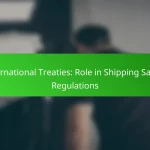Shipping companies face significant economic losses due to operational inefficiencies, market fluctuations, and unforeseen disruptions, which can threaten their profitability and sustainability. Liability concerns, including carrier responsibilities and cargo protection, are essential for minimizing these losses and developing effective recovery strategies. By adopting comprehensive insurance, robust risk management, and exploring legal recourse, shipping firms can enhance their resilience and financial stability.

How do shipping companies face economic losses?
Shipping companies encounter economic losses through various factors, including operational inefficiencies, fluctuating market conditions, and unexpected disruptions. These losses can significantly impact their profitability and long-term viability.
Impact of global supply chain disruptions
Global supply chain disruptions can severely affect shipping companies by causing delays and increasing operational costs. Events such as natural disasters, geopolitical tensions, or pandemics can lead to port closures and reduced cargo availability.
For instance, during the COVID-19 pandemic, many shipping companies experienced significant delays due to port congestion and labor shortages. To mitigate these impacts, companies should diversify their supply chains and establish contingency plans for unexpected disruptions.
Effects of fuel price fluctuations
Fuel price fluctuations directly influence shipping costs, as fuel typically accounts for a substantial portion of operational expenses. When fuel prices rise, shipping companies may face increased costs that can erode profit margins.
To manage these fluctuations, companies can implement fuel hedging strategies or invest in more fuel-efficient vessels. Additionally, monitoring fuel price trends can help companies adjust their pricing strategies to maintain competitiveness.
Challenges from regulatory changes
Regulatory changes can impose additional costs and operational challenges for shipping companies. Compliance with new environmental regulations, such as emissions standards, often requires significant investment in technology and training.
Shipping companies should stay informed about upcoming regulations and consider proactive measures to ensure compliance. This may include investing in cleaner technologies or participating in industry groups to advocate for favorable regulatory conditions.

What are the liability issues in shipping?
Liability issues in shipping primarily revolve around the responsibilities of carriers, the protection of cargo, and claims from third parties. Understanding these aspects is crucial for mitigating economic losses and ensuring effective recovery strategies.
Carrier liability under the Hague-Visby Rules
The Hague-Visby Rules establish a framework for carrier liability in international shipping, outlining the obligations of carriers regarding the safe transport of goods. Under these rules, carriers are liable for loss or damage to cargo unless they can prove that the loss resulted from specific exceptions, such as inherent vice or improper packing.
Carriers must also adhere to strict timelines for notifying shippers of any loss or damage. Failure to comply can result in increased liability, making it essential for carriers to maintain accurate records and communication throughout the shipping process.
Liability for cargo damage and loss
Liability for cargo damage and loss can vary significantly based on the terms of the shipping contract and applicable laws. Generally, carriers are responsible for ensuring that cargo is delivered in the same condition as when it was received, barring any exceptions outlined in the contract.
Shippers should consider purchasing cargo insurance to protect against potential losses. This insurance can cover damages that exceed the liability limits set by the carrier, which are often based on the weight of the cargo or a fixed monetary amount per package.
Third-party liability claims
Third-party liability claims arise when damage or loss affects parties outside the shipping contract, such as port authorities or other businesses. Carriers may face claims for damages caused by accidents or delays that impact third parties, which can lead to significant financial repercussions.
To mitigate these risks, carriers should implement comprehensive risk management strategies, including adequate insurance coverage and adherence to safety regulations. Regular training for staff on compliance and safety protocols can also help reduce the likelihood of incidents leading to third-party claims.

What recovery strategies can shipping companies implement?
Shipping companies can implement various recovery strategies to mitigate economic losses and enhance their liability management. Key strategies include obtaining comprehensive insurance coverage, establishing robust risk management frameworks, and exploring legal recourse options for recovery.
Insurance coverage options
Insurance coverage is crucial for shipping companies to protect against financial losses from accidents, cargo damage, or liability claims. Common types of insurance include hull and machinery insurance, cargo insurance, and protection and indemnity (P&I) insurance. Each type serves a specific purpose, so companies should assess their unique risks to determine the appropriate coverage levels.
When selecting insurance, consider factors such as the value of the cargo, the routes taken, and historical loss data. Engaging with a knowledgeable insurance broker can help identify the best policies and negotiate favorable terms. Regularly reviewing and updating insurance coverage is essential to adapt to changing business conditions.
Risk management frameworks
Implementing a risk management framework allows shipping companies to identify, assess, and mitigate potential risks effectively. This framework should include risk assessment processes, incident reporting systems, and regular training for staff on safety protocols. By fostering a culture of safety and accountability, companies can reduce the likelihood of incidents that lead to economic losses.
Consider adopting industry standards such as ISO 31000 for risk management, which provides guidelines for creating a structured approach. Regular audits and reviews of risk management practices can help identify areas for improvement and ensure compliance with regulations, ultimately enhancing operational resilience.
Legal recourse for recovery
Legal recourse is an important avenue for shipping companies to recover losses resulting from breaches of contract or negligence. Companies should familiarize themselves with relevant maritime laws and regulations, as these can vary significantly by jurisdiction. Engaging legal counsel with expertise in maritime law can provide valuable guidance on the best course of action.
In cases of disputes, mediation or arbitration can be effective alternatives to litigation, often resulting in quicker resolutions. Companies should maintain thorough documentation of contracts, communications, and incidents to support their claims. Understanding the limitations and timeframes for filing claims is crucial to ensure that recovery efforts are not hindered by legal technicalities.

How can shipping companies mitigate economic losses in the US?
Shipping companies in the US can mitigate economic losses by adopting strategic measures that enhance operational efficiency, improve supplier relationships, and reduce costs. Implementing technology, negotiating favorable contracts, and adopting cost-cutting practices are essential steps in this process.
Adopting technology for efficiency
Investing in technology can significantly enhance the efficiency of shipping operations. Tools such as automated tracking systems and route optimization software help reduce delays and improve delivery times, which can lead to lower operational costs.
For example, using GPS and real-time data analytics allows companies to monitor shipments closely and adjust routes as needed, potentially saving fuel costs and time. Embracing digital platforms for inventory management can also streamline processes and reduce waste.
Negotiating better contracts with suppliers
Establishing strong relationships with suppliers and negotiating better contract terms can help shipping companies lower their expenses. This includes securing bulk discounts, flexible payment terms, and favorable shipping rates.
Companies should regularly review supplier agreements to ensure they are receiving competitive pricing and quality service. Engaging in long-term partnerships can also lead to better terms and reliability, which can mitigate risks of economic losses.
Implementing cost-cutting measures
Cost-cutting measures are crucial for maintaining profitability in the shipping industry. Companies can evaluate their operational processes to identify areas where expenses can be reduced without sacrificing service quality.
Common strategies include optimizing fuel consumption, reducing overtime costs, and minimizing unnecessary overhead. Conducting regular audits of expenses can help pinpoint inefficiencies and lead to actionable improvements.

What role does cargo insurance play in liability management?
Cargo insurance is essential for managing liability in shipping, as it protects against financial losses due to damage, theft, or loss of goods during transit. By covering potential risks, it helps businesses mitigate the impact of unforeseen events and ensures smoother recovery processes.
Types of cargo insurance policies
There are several types of cargo insurance policies, including open cargo policies, which cover all shipments during a specified period, and specific voyage policies, which cover individual shipments. Additionally, there are all-risk policies that provide comprehensive coverage against most risks, while named perils policies only cover specific risks listed in the policy.
Choosing the right type depends on factors such as the nature of the goods, shipping frequency, and the value of the cargo. Businesses should assess their shipping patterns and potential risks to select the most suitable policy.
Benefits of comprehensive coverage
Comprehensive cargo insurance coverage offers significant advantages, including peace of mind and financial protection against a wide range of risks. It can cover losses from natural disasters, accidents, and even theft, which can be particularly beneficial for high-value or fragile goods.
Moreover, comprehensive coverage often simplifies the claims process, as it reduces disputes over what is covered. This can lead to quicker recovery times and less disruption to business operations.
Claim processes for cargo insurance
The claim process for cargo insurance typically involves several key steps. First, the insured must notify the insurance provider as soon as a loss occurs, providing details about the incident and the cargo affected. Documentation, such as shipping receipts and photographs of the damage, is crucial for substantiating the claim.
After submission, the insurer will assess the claim and may conduct an investigation. It’s important for businesses to keep thorough records and communicate clearly with the insurer throughout the process to avoid delays and ensure a smoother resolution.

How do international regulations affect shipping liabilities?
International regulations significantly shape shipping liabilities by establishing standards for safety, environmental protection, and crew welfare. Compliance with these regulations can mitigate financial losses and legal risks for shipping companies.
Impact of the Maritime Labour Convention
The Maritime Labour Convention (MLC) sets minimum working and living standards for seafarers, impacting shipping liabilities directly. Companies must ensure compliance to avoid penalties and claims related to crew welfare.
For instance, if a shipping company fails to provide adequate living conditions as mandated by the MLC, it may face legal actions from crew members, leading to financial losses. This could include compensation claims or fines imposed by regulatory bodies.
To effectively manage these liabilities, shipping companies should regularly audit their compliance with the MLC and invest in training for crew management. This proactive approach can help prevent violations and enhance overall operational efficiency.










